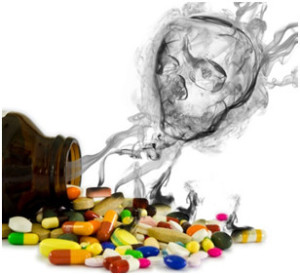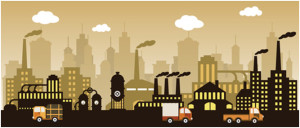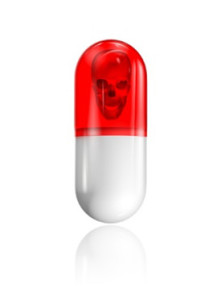Do Your Supplements Contain Carcinogens?
Author: Dr. Stephen Chaney
 Most of us take supplements to improve our health. We count on those supplements being pure and effective. We don’t expect the supplements we take to contain carcinogenic (cancer causing) contaminants. However, that expectation appears to be unfounded. A recent study found that 72% of supplements tested were contaminated with a particularly dangerous class of cancer causing chemicals called polycyclic aromatic hydrocarbons (PAHs)
Most of us take supplements to improve our health. We count on those supplements being pure and effective. We don’t expect the supplements we take to contain carcinogenic (cancer causing) contaminants. However, that expectation appears to be unfounded. A recent study found that 72% of supplements tested were contaminated with a particularly dangerous class of cancer causing chemicals called polycyclic aromatic hydrocarbons (PAHs)
Where Do PAHs Come From andWhy Are TheyDeadly?
Polycyclic aromatic hydrocarbons (PAHs) are produced by incomplete combustion of organic materials. Major environmental sources of PAHs are incomplete burning of gasoline, coal and other fuels. Unfortunately, automobile exhaust, coal burning power plants, and exhaust from factories are almost ubiquitous in today’s world, resulting in significant PAH contamination of our air, water, and soil. The unfortunate truth is that we all live in an increasingly dirty and toxic environment.
 As you might imagine, cigarette smoke is the #1 source of PAHs in humans. However, foods are a major route for PAH exposure in humans as well. There are many food sources of PAHs. For example,
As you might imagine, cigarette smoke is the #1 source of PAHs in humans. However, foods are a major route for PAH exposure in humans as well. There are many food sources of PAHs. For example,
- Grilling, roasting and frying foods, especially meats, at high temperatures creates PAHs.
- Smoking fish or meats creates PAHs.
- Barbecuing meats creates PAHs.
- Even plant-based foods can contain PAHs if the soil, air or water they were grown in was contaminated.
- PAHs can be introduced into supplements if any of their ingredients are dried at high temperatures as part of the processing procedure.
By now you are probably realizing that it is not just our environment that is increasingly being contaminated with PAHs. We are all becoming contaminated with PAHs as well. Our bodies are becoming toxic waste dumps.
Unfortunately, PAHs are not innocuous chemicals. Perhaps the best studied and deadliest of the PAHs is a compound called benzo[a]pyrene. It is classified as a class 1 carcinogen and mutagen by the IARC (International Agency for Research on Cancer). Perhaps some explanation is in order:
- The IARC is an international organization that is charged with evaluating the scientific evidence for the carcinogenicity of various chemicals. It also sets upper limits for safe exposure to those chemicals.
- Class 1 carcinogens are compounds that the IARC has classified as definitely carcinogenic to humans. Simply put, the IARC considers the scientific evidence to be overwhelming that those compounds are carcinogens.
To date only 118 compounds have been blacklisted by the IARC as class 1 carcinogens and benzo[a]pyrene is one of them. However, many of the other, less studied, PAHs are classified as probable carcinogens by the IARC.
Unfortunately, in most countries of the world (including the United States), PAH limits in food and supplements are unregulated. Because they are unregulated, many supplement companies don’t even test for them. That is unfortunate because a recent study shows that many supplements are contaminated with high levels of PAHs, and their manufacturers didn’t even know it.
Do Your Supplements Contain PAHs or Other Carcinogens?
 The European Union has taken the lead in regulating PAH levels. They have used the IARC guidelines to create upper allowable limits for PAHs in food and supplements. Separate standards were set for benzo[a]pyrene and the total of the four most common PAH contaminants (benzo[a]anthracene, benzo[a]pyrene, benzo[b]fluoranthrene, and chrysene). Those new regulations just went into effect April 1st 2016.
The European Union has taken the lead in regulating PAH levels. They have used the IARC guidelines to create upper allowable limits for PAHs in food and supplements. Separate standards were set for benzo[a]pyrene and the total of the four most common PAH contaminants (benzo[a]anthracene, benzo[a]pyrene, benzo[b]fluoranthrene, and chrysene). Those new regulations just went into effect April 1st 2016.
To gauge the impact of these new regulations on the supplement industry, the EU asked the European Union Reference Laboratory to measure the levels of PAH contamination in supplements sold in the EU prior to the implementation of the new regulations. Because vitamin and mineral supplements are seldom contaminated with PAHs, they were excluded from the study.
The EU Reference Laboratory started collecting a wide range of herbal and botanical supplements, fish and edible oil food supplements, and propolis and other bee supplements sold in the EU in 2013. The Reference Laboratory analyzed 94 different supplements for PAH contamination, and the results of these analyses were published in October 2015 (Z. Zelinkova and T. Wenzyl, Food Additives & Contaminants: Part A, 32: 1914-1926, 2015).
[In case you, like me, were wondering what propolis is, it is a resin like substance that bees use as a glue to hold their hives together. WebMD states that it may have some use as a topical agent for cold sores, genital herpes, and after mouth surgery, but that any other uses are unproven. However, if you visit websites for propolis products you find it in capsules and liquids for internal consumption. You are told that it cures bacterial and fungal infections, cures viral infections like AIDs, cures cancer, and removes warts.]
The results of their analysis were pretty scary:
- 72% of the supplements tested exceeded EU limits for the four most common PAH contaminants, and 52% exceeded EU limits for benzo[a]pyrene.
- Propolis and spirulina were the most heavily contaminated supplements. Valerian and St. John’s Wort had moderately high levels of contamination, and some samples of bee pollen, sea buckthorn oil, barley greens, Echinacea, and Ginko far exceeded EU standards.
- If consumers took the recommended dosage of the two most contaminated products (Premium Spirulina and Propolis Intense) they would more than double their daily intake of PAHs and far exceed what the IARC considers safe.
- Fish oils generally had low levels of PAH contamination. The authors speculated this may be because fish have the ability to metabolize PAHs. However, other edible oils, particularly sea buckthorn oil and a mixture of garlic oil with soybean and sunflower oils did exhibit significant PAH contamination. The authors speculated that this PAH contamination may have been introduced during the processing of these oils.
Why The PAH and Contamination Problem Is Worse Than You Thought
 You might be thinking what could be worse than 72% of supplements being contaminated with cancer causing PAHs? Here is some food for thought.
You might be thinking what could be worse than 72% of supplements being contaminated with cancer causing PAHs? Here is some food for thought.
- PAHs are just the tip of the iceberg. Many supplements are also contaminated with PCBs and heavy metals. For example:
- Fish oil is often contaminated PCBs.
- Rice protein and other rice-derived ingredients are often contaminated with lead and/or mercury.
- The US regulates PAHs in our water supply, but does not currently regulate PAHs in our supplements. That means that manufacturers that make products primarily for consumption in the US have no incentive to test their products for PAH contamination. Most of them have no idea whether their products are safe or not.
- There is no guarantee that even products labeled Certified Organic and Non-GMO are free of PAH contamination. For example:
- Organic certification just means that the crop was raised using organic methods. No analysis of purity is required to assure that the crop had not been inadvertently contaminated. The same is true of non-GMO certification. No analysis of purity is required.
- Organically grown, non-GMOcrops that are used as ingredients for supplements can still be contaminated if the air, soil or water is contaminated from any nearby pollution source. For example, ground water pollution is the major source of the heavy metal contamination often seen in rice-derived ingredients.
- Organically grown, non-GMO crops can even become contaminated by PAHs if they are grown next to a busy highway.
- Even if the ingredients are pure to begin with, PAH contamination can be introduced during processing.
What does all of this mean to us? It means that it is absolutely imperative that we do our due diligence and only choose supplement manufacturers whose quality control standards far exceed what is required of the industry. Our health just may depend on it.
The Bottom Line
- A recent study has reported that 72% of herbal and botanical supplements, fish and edible oil food supplements, and supplements derived from bees sold in the EU were contaminated with high levels of cancer causing polycyclic aromatic hydrocarbons (PAHs).
- The levels of PAHs in many of these products far exceeded standards recently enacted by the EU. If those supplements were taken as recommended, the daily intake of PAHs by people consuming them would also far exceed the safe limits of exposure to these toxic chemicals set in place by the International Agency for Research on Cancer.
- While all of this sounds bad enough, the news is even worse for most of us living in the US.
- PAHs are just the tip of the iceberg. Many supplements are also contaminated with PCBs and heavy metals.
- The US regulates PAHs in our water supply, but does not currently regulate PAHs in our supplements. That means that manufacturers that make products primarily for consumption in the US have no incentive to test their products for PAH contamination. Most of them have no idea whether their products are safe or not.
- There is no guarantee that even products labeled Certified Organic and Non-GMO are free of PAH contamination.
- What does all of this mean to us? It means that it is absolutely imperative that we do our due diligence and only choose supplements manufacturers whose quality control standards far exceed what is required of the industry. Our health just may depend on it. Remember, PAHs are not the only potential problem.
These statements have not been evaluated by the Food and Drug Administration. This information is not intended to diagnose, treat, cure or prevent any disease.
